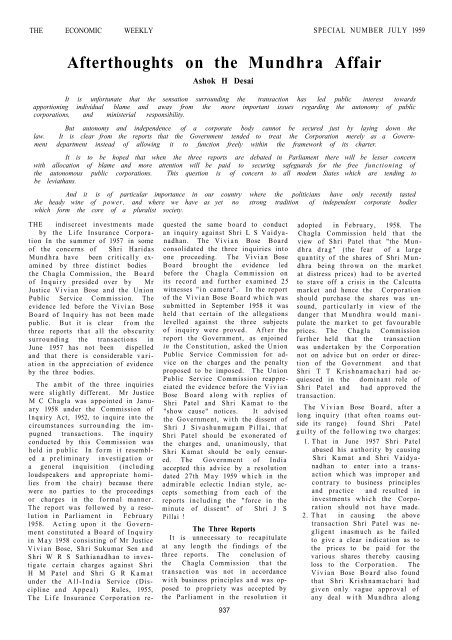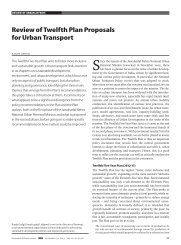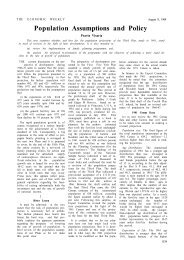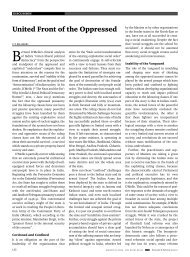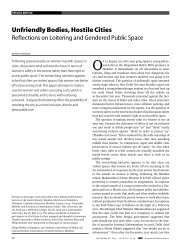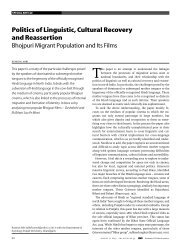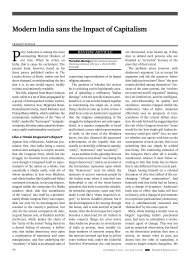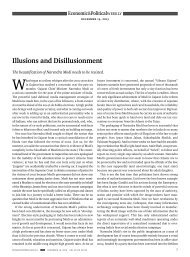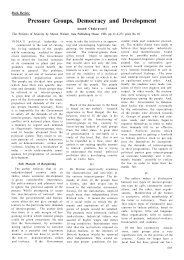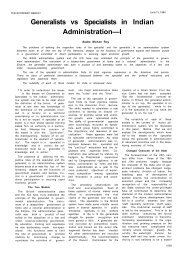Afterthoughts on the Mundhra Affair - Economic and Political Weekly
Afterthoughts on the Mundhra Affair - Economic and Political Weekly
Afterthoughts on the Mundhra Affair - Economic and Political Weekly
Create successful ePaper yourself
Turn your PDF publications into a flip-book with our unique Google optimized e-Paper software.
THE ECONOMIC WEEKLY SPECIAL NUMBER JULY 1959<br />
<str<strong>on</strong>g>Afterthoughts</str<strong>on</strong>g> <strong>on</strong> <strong>the</strong> <strong>Mundhra</strong> <strong>Affair</strong><br />
Ashok H Desai<br />
It is unfortunate that <strong>the</strong> sensati<strong>on</strong> surrounding <strong>the</strong> transacti<strong>on</strong> has led public interest towards<br />
apporti<strong>on</strong>ing individual blame <strong>and</strong> away from <strong>the</strong> more important issues regarding <strong>the</strong> aut<strong>on</strong>omy of public<br />
corporati<strong>on</strong>s, <strong>and</strong> ministerial resp<strong>on</strong>sibility.<br />
But aut<strong>on</strong>omy <strong>and</strong> independence of a corporate body cannot be secured just by laying down <strong>the</strong><br />
law. It is clear from <strong>the</strong> reports that <strong>the</strong> Government tended to treat <strong>the</strong> Corporati<strong>on</strong> merely as a Government<br />
department instead of allowing it to functi<strong>on</strong> freely within <strong>the</strong> framework of its charter.<br />
It is to be hoped that when <strong>the</strong> three reports are debated in Parliament <strong>the</strong>re will be lesser c<strong>on</strong>cern<br />
with allocati<strong>on</strong> of blame <strong>and</strong> more attenti<strong>on</strong> will be paid to securing safeguards for <strong>the</strong> free functi<strong>on</strong>ing of<br />
<strong>the</strong> aut<strong>on</strong>omous public corporati<strong>on</strong>s. This questi<strong>on</strong> is of c<strong>on</strong>cern to all modem States which are tending to<br />
be leviathans.<br />
And it is of particular importance in our country where <strong>the</strong> politicians have <strong>on</strong>ly recently tasted<br />
<strong>the</strong> heady wine of power, <strong>and</strong> where we have as yet no str<strong>on</strong>g traditi<strong>on</strong> of independent corporate bodies<br />
which form <strong>the</strong> core of a pluralist society.<br />
THE indiscreet investments made<br />
by <strong>the</strong> Life Insurance Corporati<strong>on</strong><br />
In <strong>the</strong> summer of 1957 in some<br />
of <strong>the</strong> c<strong>on</strong>cerns of Shri Haridas<br />
<strong>Mundhra</strong> have been critically examined<br />
by three distinct bodies<br />
<strong>the</strong> Chagla Commissi<strong>on</strong>, <strong>the</strong> Board<br />
of Inquiry presided over by Mr<br />
Justice Vivian Bose <strong>and</strong> <strong>the</strong> Uni<strong>on</strong><br />
Public Service Commissi<strong>on</strong>. The<br />
evidence led before <strong>the</strong> Vivian Bose<br />
Board of Inquiry has not been made<br />
public. But it is clear from <strong>the</strong><br />
three reports that all <strong>the</strong> obscurity<br />
surrounding <strong>the</strong> transacti<strong>on</strong>s in<br />
June 1957 has not been dispelled<br />
<strong>and</strong> that <strong>the</strong>re is c<strong>on</strong>siderable variati<strong>on</strong><br />
in <strong>the</strong> appreciati<strong>on</strong> of evidence<br />
by <strong>the</strong> three bodies.<br />
The ambit of <strong>the</strong> three inquiries<br />
were slightly different. Mr Justice<br />
M C Chagla was appointed in January<br />
1958 under <strong>the</strong> Commissi<strong>on</strong> of<br />
Inquiry Act, 1952, to inquire into <strong>the</strong><br />
circumstances surrounding <strong>the</strong> impugned<br />
transacti<strong>on</strong>s. The inquiry<br />
c<strong>on</strong>ducted by this Commissi<strong>on</strong> was<br />
held in public In form it resembled<br />
a preliminary investigati<strong>on</strong> or<br />
a general inquisiti<strong>on</strong> (including<br />
loudspeakers <strong>and</strong> appropriate homilies<br />
from <strong>the</strong> chair) because <strong>the</strong>re<br />
were no parties to <strong>the</strong> proceedings<br />
or charges in <strong>the</strong> formal manner.<br />
The report was followed by a resoluti<strong>on</strong><br />
in Parliament in February<br />
1958. Acting up<strong>on</strong> it <strong>the</strong> Government<br />
c<strong>on</strong>stituted a Board of Inquiry<br />
in May 1958 c<strong>on</strong>sisting of Mr Justice<br />
Vivian Bose, Shri Sukumar Sen <strong>and</strong><br />
Shri W R S Sathianadhan to investigate<br />
certain charges against Shri<br />
H M Patel <strong>and</strong> Shri G R Kamat<br />
under <strong>the</strong> All-India Service (Discipline<br />
<strong>and</strong> Appeal) Rules, 1955,<br />
The Life Insurance Corporati<strong>on</strong> requested<br />
<strong>the</strong> same board to c<strong>on</strong>duct<br />
an inquiry against Shri L S Vaidyanadhan.<br />
The Vivian Bose Board<br />
c<strong>on</strong>solidated <strong>the</strong> three inquiries into<br />
<strong>on</strong>e proceeding. The Vivian Bose<br />
Board brought <strong>the</strong> evidence led<br />
before <strong>the</strong> Chagla Commissi<strong>on</strong> <strong>on</strong><br />
its record <strong>and</strong> fur<strong>the</strong>r examined 25<br />
witnesses "in camera". In <strong>the</strong> report<br />
of <strong>the</strong> Vivian Bose Board which was<br />
submitted in September 1958 it was<br />
held that certain of <strong>the</strong> allegati<strong>on</strong>s<br />
levelled against <strong>the</strong> three subjects<br />
of inquiry were proved. After <strong>the</strong><br />
report <strong>the</strong> Government, as enjoined<br />
in <strong>the</strong> C<strong>on</strong>stituti<strong>on</strong>, asked <strong>the</strong> Uni<strong>on</strong><br />
Public Service Commissi<strong>on</strong> for advice<br />
<strong>on</strong> <strong>the</strong> charges <strong>and</strong> <strong>the</strong> penalty<br />
proposed to be imposed. The Uni<strong>on</strong><br />
Public Service Commissi<strong>on</strong> reappreeiated<br />
<strong>the</strong> evidence before <strong>the</strong> Vivian<br />
Bose Board al<strong>on</strong>g with replies of<br />
Shri Patel <strong>and</strong> Shri Kamat to <strong>the</strong><br />
"show cause" notices. It advised<br />
<strong>the</strong> Government, with <strong>the</strong> dissent of<br />
Shri J Sivashunmugam Pillai, that<br />
Shri Patel should be ex<strong>on</strong>erated of<br />
<strong>the</strong> charges <strong>and</strong>, unanimously, that<br />
Shri Kamat should be <strong>on</strong>ly censured.<br />
The Government of India<br />
accepted this advice by a resoluti<strong>on</strong><br />
dated 27th May 1959 which in <strong>the</strong><br />
admirable eclectic Indian style, accepts<br />
something from each of <strong>the</strong><br />
reports including <strong>the</strong> "force in <strong>the</strong><br />
minute of dissent" of Shri J S<br />
Pillai !<br />
The Three Reports<br />
It is unnecessary to recapitulate<br />
at any length <strong>the</strong> findings of <strong>the</strong><br />
three reports. The c<strong>on</strong>clusi<strong>on</strong> of<br />
<strong>the</strong> Chagla Commissi<strong>on</strong> that <strong>the</strong><br />
transacti<strong>on</strong> was not in accordance<br />
with business principles <strong>and</strong> was opposed<br />
to propriety was accepted by<br />
<strong>the</strong> Parliament in <strong>the</strong> resoluti<strong>on</strong> it<br />
937<br />
adopted in February, 1958. The<br />
Chagla Commissi<strong>on</strong> held that <strong>the</strong><br />
view of Shri Patel that "<strong>the</strong> <strong>Mundhra</strong><br />
drag" (<strong>the</strong> fear of a large<br />
quantity of <strong>the</strong> shares of Shri <strong>Mundhra</strong><br />
being thrown <strong>on</strong> <strong>the</strong> market<br />
at distress prices) had to be averted<br />
to stave off a crisis in <strong>the</strong> Calcutta<br />
market <strong>and</strong> hence <strong>the</strong> Corporati<strong>on</strong><br />
should purchase <strong>the</strong> shares was unsound,<br />
particularly in view of <strong>the</strong><br />
danger that <strong>Mundhra</strong> would manipulate<br />
<strong>the</strong> market to get favourable<br />
prices. The Chagla Commissi<strong>on</strong><br />
fur<strong>the</strong>r held that <strong>the</strong> transacti<strong>on</strong><br />
was undertaken by <strong>the</strong> Corporati<strong>on</strong><br />
not <strong>on</strong> advice but <strong>on</strong> order or directi<strong>on</strong><br />
of <strong>the</strong> Government <strong>and</strong> that<br />
Shri T T Krishnamachari had acquiesced<br />
in <strong>the</strong> dominant role of<br />
Shri Patel <strong>and</strong> had approved <strong>the</strong><br />
transacti<strong>on</strong>.<br />
The Vivian Bose Board, after a<br />
l<strong>on</strong>g inquiry (that often roams outside<br />
its range) found Shri Patel<br />
guilty of <strong>the</strong> following two charges:<br />
1. That in June 1957 Shri Patel<br />
abused his authority by causing<br />
Shri Kamat <strong>and</strong> Shri Vaidyanadhan<br />
to enter into a transacti<strong>on</strong><br />
which was improper <strong>and</strong><br />
c<strong>on</strong>trary to business principles<br />
<strong>and</strong> practice <strong>and</strong> resulted in<br />
investments which <strong>the</strong> Corporati<strong>on</strong><br />
should not have made.<br />
2. That in causing <strong>the</strong> above<br />
transacti<strong>on</strong> Shri Patel was negligent<br />
inasmuch as he failed<br />
to give a clear indicati<strong>on</strong> as to<br />
<strong>the</strong> prices to be paid for <strong>the</strong><br />
various shares <strong>the</strong>reby causing<br />
loss to <strong>the</strong> Corporati<strong>on</strong>. The<br />
Vivian Bose Board also found<br />
that Shri Krishnamachari had<br />
given <strong>on</strong>ly vague approval of<br />
any deal with <strong>Mundhra</strong> al<strong>on</strong>g
SPECIAL NUMBER JULY 1959 THE ECONOMIC WEEKLY<br />
938
THE ECONOMIC WEEKLY SPECIAL NUMBER JULY 1959<br />
"with a cauti<strong>on</strong>ary rider <strong>and</strong><br />
that Shri Patel's acti<strong>on</strong> was<br />
not covered by ministerial approval<br />
or authority.<br />
The Uni<strong>on</strong> Public Service Commissi<strong>on</strong>,<br />
<strong>on</strong> <strong>the</strong> o<strong>the</strong>r h<strong>and</strong>, held<br />
that <strong>the</strong>re was no basis for <strong>the</strong><br />
charge that Shri Patel abused his<br />
authority for he could not have<br />
"caused" Shri Kamat <strong>and</strong> Shri Vaidyanadhan<br />
to enter into <strong>the</strong> transacti<strong>on</strong><br />
nor was <strong>the</strong> transacti<strong>on</strong> improper<br />
as far Shri Patel was c<strong>on</strong>cerned.<br />
The Commissi<strong>on</strong> also held<br />
that <strong>the</strong> sec<strong>on</strong>d .charge was also not<br />
proved. Regarding Shri Kamat,<br />
<strong>the</strong> Commissi<strong>on</strong> held that <strong>the</strong> charge<br />
of impropriety <strong>and</strong> unbusinesslike<br />
nature of <strong>the</strong> transacti<strong>on</strong> was established<br />
<strong>on</strong>ly in regard to <strong>the</strong> prices<br />
fixed <strong>and</strong> <strong>the</strong> resulting loss to <strong>the</strong><br />
Corporati<strong>on</strong>. It also held <strong>the</strong> o<strong>the</strong>r<br />
allegati<strong>on</strong> against Shri Kamat of<br />
failure to discharge his duties as<br />
Chairman of <strong>the</strong> Corporati<strong>on</strong> proved,<br />
inasmuch as due care <strong>and</strong> cauti<strong>on</strong><br />
were not exercised by Shri Kamat<br />
in fixing <strong>the</strong> prices.<br />
The Government has accepted <strong>the</strong><br />
advice of <strong>the</strong> Uni<strong>on</strong> Public Service<br />
Commissi<strong>on</strong> <strong>and</strong> has dropped <strong>the</strong><br />
charges against Shri Patel <strong>and</strong> has<br />
imposed <strong>the</strong> penalty of censure <strong>on</strong><br />
Shri Kamat. The Commissi<strong>on</strong> also<br />
c<strong>on</strong>cluded that Shri Krishnamachari<br />
was aware of <strong>the</strong> antecedents of<br />
<strong>Mundhra</strong>. that in <strong>the</strong> c<strong>on</strong>text of this<br />
knowledge Shri Patel had adequately<br />
apprised <strong>the</strong> Minister about <strong>the</strong><br />
transacti<strong>on</strong> <strong>and</strong> that Shri Patel<br />
with good reas<strong>on</strong>s h<strong>on</strong>estly believed<br />
that <strong>the</strong> Minister approved of <strong>the</strong><br />
deal being entered into.<br />
Saddening Spectacle<br />
In spite of <strong>the</strong> differences in <strong>the</strong><br />
assessment of evidence, some unhappy<br />
features are noticed by all<br />
<strong>the</strong> three reports. The first is <strong>the</strong><br />
manner in which <strong>the</strong> aut<strong>on</strong>omy of<br />
<strong>the</strong> Corporati<strong>on</strong> was flouted with<br />
<strong>the</strong> c<strong>on</strong>nivance of its highest officials.<br />
The Chagla Commissi<strong>on</strong> described<br />
<strong>the</strong> tendency <strong>on</strong> <strong>the</strong> part of <strong>the</strong><br />
Finance Ministry to look up<strong>on</strong> <strong>the</strong><br />
Corporati<strong>on</strong> as a wing or branch of<br />
that Ministry <strong>and</strong> to issue orders to<br />
it in <strong>the</strong> belief that <strong>the</strong> Corporati<strong>on</strong><br />
was bound to carry out those orders.<br />
Ano<strong>the</strong>r feature is <strong>the</strong> "amazing<br />
manner" (Chagla Commissi<strong>on</strong> Report)<br />
in which <strong>the</strong> price <strong>the</strong> Corporati<strong>on</strong><br />
had to pay for <strong>the</strong> shares was<br />
fixed <strong>and</strong> that decisi<strong>on</strong>s of <strong>the</strong> higheat<br />
importance were taken in a<br />
manner that indicated "gross negligence<br />
or gross incompetence" (descripti<strong>on</strong><br />
by <strong>the</strong> Vivian Bose Board).<br />
But what stunned <strong>the</strong> public most<br />
was <strong>the</strong> unedifying behaviour of <strong>the</strong><br />
dramatis pers<strong>on</strong>ae when called forth<br />
to justify <strong>the</strong>ir behaviour under<br />
public scrutiny. The Vivian Bose<br />
Board describes <strong>the</strong> saddening spectacle:<br />
"We find some of <strong>the</strong> highest<br />
officials in <strong>the</strong> l<strong>and</strong> shirking resp<strong>on</strong>sibility<br />
<strong>and</strong> hiding <strong>the</strong> truth. We<br />
find each trying to wash his h<strong>and</strong>s<br />
of a matter that has evoked much<br />
public criticism <strong>and</strong> each trying to<br />
throw <strong>the</strong> blame <strong>on</strong> <strong>the</strong> o<strong>the</strong>r...We<br />
have not been told <strong>the</strong> whole truth<br />
<strong>and</strong> some at least of what we have<br />
heard must be false."<br />
Theory of Party Funds<br />
—Not Sustained<br />
It is in <strong>the</strong> light of <strong>the</strong>se observati<strong>on</strong>s<br />
that <strong>on</strong>e must examine <strong>the</strong><br />
most remarkable c<strong>on</strong>clusi<strong>on</strong> of <strong>the</strong><br />
Vivian Bose Board—<strong>the</strong> c<strong>on</strong>clusi<strong>on</strong><br />
that permeates <strong>the</strong> report <strong>and</strong> establishes<br />
that <strong>the</strong> main allegati<strong>on</strong>s<br />
against Shri Patel are proved. The<br />
Vivian Bose Board not <strong>on</strong>ly held<br />
that <strong>the</strong>re was no imminent danger<br />
to <strong>the</strong> Calcutta market in June 1957<br />
<strong>and</strong> that Shri Patel's <strong>the</strong>ory about<br />
<strong>the</strong> <strong>Mundhra</strong> drag' was unsound but<br />
it arrived at <strong>the</strong> finding that <strong>the</strong><br />
drag <strong>the</strong>ory was an afterthought <strong>and</strong><br />
a blind <strong>and</strong> that <strong>the</strong> transacti<strong>on</strong><br />
was entered into to help <strong>Mundhra</strong><br />
The <strong>on</strong>ly motive that suggested itself<br />
to <strong>the</strong> Board for this investment<br />
of a crore <strong>and</strong> a quarter of public<br />
m<strong>on</strong>ey in <strong>the</strong> <strong>Mundhra</strong> c<strong>on</strong>cerns was<br />
that this investment was a quid pro<br />
quo for <strong>the</strong> d<strong>on</strong>ati<strong>on</strong> of a lakh <strong>and</strong><br />
a half to <strong>the</strong> U P C<strong>on</strong>gress Party,<br />
<strong>on</strong>e lakh to <strong>the</strong> Central C<strong>on</strong>gress<br />
Party <strong>and</strong> perhaps for <strong>the</strong> loss of<br />
about 20 lakhs that would be sustained<br />
by <strong>the</strong> philanthropic <strong>Mundhra</strong><br />
by recalling <strong>the</strong> closure notices relating<br />
to <strong>the</strong> Kanpur Mills. The<br />
c<strong>on</strong>clusi<strong>on</strong> is extremely damaging<br />
(as P<strong>and</strong>it Nehru painfully noticed)<br />
<strong>and</strong> could be arrived at <strong>on</strong>ly <strong>on</strong><br />
clear <strong>and</strong> cogent evidence. Unfortunately,<br />
<strong>on</strong> <strong>the</strong> record that is available,<br />
it cannot be sustained. The<br />
Vivian Bose Board itself arrived at<br />
<strong>the</strong> c<strong>on</strong>clusi<strong>on</strong> by <strong>the</strong> process of reductio<br />
ad absurdum legitimate in<br />
logic but not in judicial reas<strong>on</strong>ing.<br />
The manner in which <strong>the</strong> transacti<strong>on</strong><br />
was carried out was hasty,<br />
improper, negligent <strong>and</strong> hence, in<br />
<strong>the</strong> eyes of <strong>the</strong> Board, suspect.<br />
The Board argued that if all defence<br />
versi<strong>on</strong>s were suspect, it would have<br />
to reject <strong>the</strong> 'drag' <strong>the</strong>ory. <strong>Mundhra</strong><br />
in his evidence had referred to<br />
939<br />
his d<strong>on</strong>ati<strong>on</strong>s to <strong>the</strong> C<strong>on</strong>gress,<br />
Hence <strong>the</strong> Board accepted this tenuous<br />
link to arrive at a damning<br />
c<strong>on</strong>clusi<strong>on</strong> without putting this case<br />
to Shri Krishnamachari, Shri Patel<br />
or any official of <strong>the</strong> Corporati<strong>on</strong>.<br />
Nor did <strong>the</strong> Board investigate in<br />
what manner <strong>the</strong> wave of gratitude<br />
was set off from <strong>the</strong> treasury of<br />
<strong>the</strong> U P C<strong>on</strong>gress <strong>and</strong> <strong>the</strong> coffers<br />
of <strong>the</strong> Central C<strong>on</strong>gress Party to<br />
<strong>the</strong> whispering c<strong>on</strong>versati<strong>on</strong> (audible<br />
<strong>on</strong>ly to a few of <strong>the</strong> participants!)<br />
in <strong>the</strong> Reserve Bank of<br />
India at Bombay. Unless <strong>the</strong>re is<br />
clear indicati<strong>on</strong> of such circumstances<br />
like instructi<strong>on</strong>s given to Shri<br />
Patel <strong>and</strong> Shri Kamat in order to<br />
oblige <strong>Mundhra</strong>, <strong>the</strong> c<strong>on</strong>clusi<strong>on</strong> of<br />
<strong>the</strong> Board is unwarranted just because<br />
<strong>the</strong> Board finds it difficult to<br />
believe <strong>the</strong> defence versi<strong>on</strong>s.<br />
The Drag Theory<br />
The whole essence of <strong>the</strong> 'drag'<br />
<strong>the</strong>ory is not whe<strong>the</strong>r <strong>the</strong>re was in<br />
fact an impending crisis in Calcutta<br />
that could be resolved by <strong>the</strong> Corporati<strong>on</strong>'s<br />
investment but (1) whe<strong>the</strong>r<br />
Shri Pated genuinely believed<br />
in such crisis <strong>and</strong> such a soluti<strong>on</strong>?<br />
<strong>and</strong> (2) whe<strong>the</strong>r such a belief was<br />
reas<strong>on</strong>able in view of <strong>the</strong> circumstances<br />
known to Shri Patel? The<br />
Uni<strong>on</strong> Public Service Commissi<strong>on</strong> has<br />
answered both questi<strong>on</strong>s in <strong>the</strong> affirmative;<br />
<strong>the</strong> Vivian Bose Board in <strong>the</strong><br />
negative. One feels that <strong>the</strong> answer<br />
to <strong>the</strong> first questi<strong>on</strong> is 'yes'; to <strong>the</strong><br />
sec<strong>on</strong>d 'no'. The evidence <strong>on</strong> record<br />
is c<strong>on</strong>sistent with Shri Patel's<br />
genuine belief in <strong>the</strong> crisis <strong>and</strong> its<br />
soluti<strong>on</strong> but that such a belief was<br />
not reas<strong>on</strong>able—<strong>the</strong> diagnosis <strong>and</strong><br />
prescripti<strong>on</strong> were indiscreet— for a<br />
civil servant of Shri Patel's percepti<strong>on</strong><br />
<strong>and</strong> calibre.<br />
It is really unnecessary to allege<br />
malafides to explain <strong>the</strong> c<strong>on</strong>duct of<br />
<strong>the</strong> highest officials <strong>and</strong> ministers<br />
c<strong>on</strong>cerned in <strong>the</strong> transacti<strong>on</strong>. The<br />
manner in which <strong>the</strong> aut<strong>on</strong>omy of<br />
<strong>the</strong> Corporati<strong>on</strong> was disregarded<br />
<strong>and</strong> <strong>the</strong> floundering, imprecise way<br />
in which decisi<strong>on</strong>s of such magnitude<br />
were fatten are indicative of<br />
<strong>the</strong> c<strong>on</strong>fusi<strong>on</strong> that gave rise to <strong>the</strong><br />
differing defence versi<strong>on</strong>s. The Vivian<br />
Bose Board refers to <strong>the</strong> need<br />
for "freedom of officials to act by<br />
displaying resp<strong>on</strong>sibility, initiative<br />
<strong>and</strong> vigour instead of sheltering<br />
behind a set of inflexible rules".<br />
"After all <strong>the</strong> battle of Trafalgar<br />
was w<strong>on</strong> because of Nels<strong>on</strong>'s 'blind<br />
eye'" observes <strong>the</strong> report. To <strong>on</strong>e<br />
pers<strong>on</strong> at least <strong>the</strong> c<strong>on</strong>fused <strong>and</strong>
SPECIAL NUMBER JULY 1959<br />
c<strong>on</strong>flicting versi<strong>on</strong>s of <strong>the</strong> principal<br />
pers<strong>on</strong>s c<strong>on</strong>cerned in <strong>the</strong> transacti<strong>on</strong><br />
are reminiscent of o<strong>the</strong>r military<br />
scenes—<strong>the</strong> battles of Austerlitz<br />
<strong>and</strong> Borodino, described by Tolstoy,<br />
where <strong>the</strong> Generals were equally<br />
c<strong>on</strong>fused, <strong>and</strong> uncertain as to what<br />
orders were being given, without<br />
any<strong>on</strong>e c<strong>on</strong>cerned displaying <strong>the</strong><br />
native wisdom of a Kutuzov.<br />
Aut<strong>on</strong>omy of Corporati<strong>on</strong>s<br />
It is unfortunate that <strong>the</strong> sensati<strong>on</strong><br />
surrounding <strong>the</strong> transacti<strong>on</strong> has<br />
led public interest towards apporti<strong>on</strong>ing<br />
individual blame <strong>and</strong> away<br />
from <strong>the</strong> more important issues regarding<br />
<strong>the</strong> aut<strong>on</strong>omy of public corporati<strong>on</strong>s,<br />
<strong>and</strong> ministerial resp<strong>on</strong>sibility.<br />
The expansi<strong>on</strong> of <strong>the</strong> public<br />
sector in this country is bound to<br />
bring to <strong>the</strong> fore <strong>the</strong> problem of<br />
<strong>the</strong> forms of corporate ownership<br />
like nati<strong>on</strong>alisati<strong>on</strong>, aut<strong>on</strong>omous<br />
corporati<strong>on</strong>s, cooperatives <strong>and</strong> gramdan.<br />
If <strong>the</strong> dangers of centralisati<strong>on</strong><br />
<strong>and</strong> c<strong>on</strong>centrati<strong>on</strong> of power (i e,<br />
"statism" which is an ugly word)<br />
are to be avoided, <strong>the</strong> efficient working<br />
of aut<strong>on</strong>omous corporati<strong>on</strong>s<br />
established al<strong>on</strong>g functi<strong>on</strong>al <strong>and</strong> regi<strong>on</strong>al<br />
lines will assume particular<br />
importance. Life Insurance was<br />
nati<strong>on</strong>alised in January 1956 <strong>and</strong> in<br />
September 1956 <strong>the</strong> Life Insurance<br />
Corporati<strong>on</strong> Act, 1956 came into<br />
force amalgamating about 240 companies.<br />
The Life Insurance Corporati<strong>on</strong><br />
Act <strong>and</strong> rules lay down <strong>the</strong><br />
law for <strong>the</strong> regulati<strong>on</strong> <strong>and</strong> c<strong>on</strong>trol<br />
of <strong>the</strong> business of <strong>the</strong> Corporati<strong>on</strong>.<br />
According to <strong>the</strong>se, <strong>the</strong> Corporati<strong>on</strong><br />
is an aut<strong>on</strong>omous body which is enjoined<br />
to act <strong>on</strong> business principles<br />
<strong>and</strong> its officers are to act primarily<br />
in <strong>the</strong> interests of <strong>the</strong> Corporati<strong>on</strong>.<br />
Secti<strong>on</strong> 21 of <strong>the</strong> Act provides that<br />
"in <strong>the</strong> discharge of its functi<strong>on</strong>s<br />
under this Act, <strong>the</strong> Corporati<strong>on</strong><br />
shall be 'guided by such directives in<br />
matters of policy involving' public<br />
Interest as <strong>the</strong> Central Government<br />
may give to it in writing." The secti<strong>on</strong><br />
circumscribes <strong>the</strong> power of <strong>the</strong><br />
Government to interfere in <strong>the</strong> day<br />
to day working of <strong>the</strong> Corporati<strong>on</strong>.<br />
But aut<strong>on</strong>omy <strong>and</strong> independence<br />
of a corporate body cannot be secured<br />
just by laying down <strong>the</strong> law.<br />
It is clear from <strong>the</strong> reports that <strong>the</strong><br />
Government tended to treat <strong>the</strong><br />
Corporati<strong>on</strong> merely as a Government<br />
department instead of allowing it<br />
to functi<strong>on</strong> freely within <strong>the</strong> framework<br />
of its charter. The relati<strong>on</strong>s<br />
between <strong>the</strong> Life Insurance Corporati<strong>on</strong><br />
<strong>and</strong> <strong>the</strong> Government cannot<br />
be excessively formal <strong>and</strong> bound<br />
in red tape. The Government in its<br />
resoluti<strong>on</strong> said that it does not feel<br />
that its c<strong>on</strong>tact with <strong>the</strong> Corporati<strong>on</strong><br />
should be c<strong>on</strong>fined merely to<br />
THE ECONOMIC WEEKLY<br />
giving statutory directi<strong>on</strong>s. But<br />
<strong>the</strong> aut<strong>on</strong>omy of a public corporati<strong>on</strong><br />
will depend not just <strong>on</strong> <strong>the</strong><br />
elaborate law that regulates its existence<br />
but <strong>on</strong> <strong>the</strong> respect <strong>the</strong> Government<br />
is prepared to accord to its<br />
independence <strong>and</strong> integrity.<br />
The three inquiries had momenta<br />
rily stripped <strong>the</strong> veil of secrecy that<br />
shrouds decisi<strong>on</strong>s of importance in<br />
public corporati<strong>on</strong>s. And <strong>the</strong> Government<br />
has not come out with<br />
much credit regarding <strong>the</strong> manner<br />
in which it interpreted its relati<strong>on</strong>ship<br />
with <strong>the</strong> aut<strong>on</strong>omous corporati<strong>on</strong>.<br />
These revelati<strong>on</strong>s at this early<br />
formative stage in <strong>the</strong> development<br />
of aut<strong>on</strong>omous corporati<strong>on</strong>s in India<br />
provide a salutary warning, It is<br />
to be hoped that when <strong>the</strong> reports<br />
are debated in Parliament <strong>the</strong>re will<br />
be lesser c<strong>on</strong>cern with allocati<strong>on</strong> of<br />
blame <strong>and</strong> more attenti<strong>on</strong> will be<br />
paid to securing safeguards for <strong>the</strong><br />
free functi<strong>on</strong>ing of <strong>the</strong> aut<strong>on</strong>omous<br />
public corporati<strong>on</strong>s. This questi<strong>on</strong><br />
is of c<strong>on</strong>cern to all modern States<br />
which are tending to be leviathans.<br />
And it is of particular importance<br />
in our country where <strong>the</strong> politicians<br />
have <strong>on</strong>ly recently tasted <strong>the</strong> heady<br />
wine of power, <strong>and</strong> where we have<br />
as yet no str<strong>on</strong>g traditi<strong>on</strong> of independent<br />
corporate bodies which form<br />
<strong>the</strong> core of a pluralist society.<br />
940


